#who see themselves in katara
Explore tagged Tumblr posts
Text
Katara's Story Is A Tragedy and It's Not An Accident
I was a teenaged girl when Avatar: The Last Airbender aired on Nickelodeon—the group that the show’s creators unintentionally hit while they were aiming for the younger, maler demographic. Nevermind that we’re the reason the show’s popularity caught fire and has endured for two decades; we weren’t the audience Mike and Bryan wanted. And by golly, were they going to make sure we knew it. They’ve been making sure we know it with every snide comment and addendum they’ve made to the story for the last twenty years.
For many of us girls who were raised in the nineties and aughts, Katara was a breath of fresh air—a rare opportunity in a media market saturated with boys having grand adventures to see a young woman having her own adventure and expressing the same fears and frustrations we were often made to feel.
We were told that we could be anything we wanted to be. That we were strong and smart and brimming with potential. That we were just as capable as the boys. That we were our brothers’ equals. But we were also told to wash dishes and fold laundry and tidy around the house while our brothers played outside. We were ignored when our male classmates picked teams for kickball and told to go play with the girls on the swings—the same girls we were taught to deride if we wanted to be taken seriously. We were lectured for the same immaturity that was expected of boys our age and older, and we were told to do better while also being told, “Boys will be boys.” Despite all the platitudes about equality and power, we saw our mothers straining under the weight of carrying both full-time careers and unequally divided family responsibilities. We sensed that we were being groomed for the same future.
And we saw ourselves in Katara.
Katara begins as a parentified teenaged girl: forced to take on responsibility for the daily care of people around her—including male figures who are capable of looking after themselves but are allowed to be immature enough to foist such labor onto her. She does thankless work for people who take her contributions for granted. She’s belittled by people who love her, but don’t understand her. She’s isolated from the world and denied opportunities to improve her talents. She's told what emotions she's allowed to feel and when to feel them. In essence, she was living our real-world fear: being trapped in someone else’s narrow, stultifying definition of femininity and motherhood.
Then we watched Katara go through an incredible journey of self-determination and empowerment. Katara goes from being a powerless, fearful victim to being a protector, healer, advocate, and liberator to others who can’t do those things for themselves (a much truer and more fulfilling definition of nurturing and motherhood). It’s necessary in Katara’s growth cycle that she does this for others first because that is the realm she knows. She is given increasingly significant opportunities to speak up and fight on behalf of others, and that allows her to build those advocacy muscles gradually. But she still holds back her own emotional pain because everyone that she attempts to express such things to proves they either don't want to deal with it or they only want to manipulate her feelings for their own purposes.
Katara continues to do much of the work we think of as traditionally maternal on behalf of her friends and family over the course of the story, but we do see that scale gradually shift. Sokka takes on more responsibility for managing the group’s supplies, and everyone helps around camp, but Katara continues to be the manager of everyone else’s emotions while simultaneously punching down her own. The scales finally seem to tip when Zuko joins the group. With Zuko, we see someone working alongside Katara doing the same tasks she is doing around camp for the first time. Zuko is also the only person who never expects anything of her and whose emotions she never has to manage because he’s actually more emotionally stable and mature than she is by that point. And then, Katara’s arc culminates in her finally getting the chance to fully seize her power, rewrite the story of the traumatic event that cast her into the role of parentified child, be her own protector, and freely express everything she’s kept locked away for the sake of letting everyone else feel comfortable around her. Then she fights alongside an equal partner she knows she can trust and depend on through the story's climax. And for the first time since her mother’s death, the girl who gives and gives and gives while getting nothing back watches someone sacrifice everything for her. But this time, she’s able to change the ending because her power is fully realized. The cycle was officially broken.
Katara’s character arc was catharsis at every step. If Katara could break the mold and recreate the ideas of womanhood and motherhood in her own image, so could we. We could be powerful. We could care for ourselves AND others when they need us—instead of caring for everyone all the time at our own expense. We could have balanced partnerships with give and take going both ways (“Tui and La, push and pull”), rather than the, “I give, they take,” model we were conditioned to expect. We could fight for and determine our own destiny—after all, wasn’t destiny a core theme of the story?
Yes. Destiny was the theme. But the lesson was that Katara didn’t get to determine hers.
After Katara achieves her victory and completes her arc, the narrative steps in and smacks her back down to where she started. For reasons that are never explained or justified, Katara rewards the hero by giving into his romantic advances even though he has invalidated her emotions, violated her boundaries, lashed out at her for slights against him she never committed, idealized a false idol of her then browbeat her when she deviated from his narrative, and forced her to carry his emotions and put herself in danger when he willingly fails to control himself—even though he never apologizes, never learns his lesson, and never shows any inclination to do better.
And do better he does not.
The more we dared to voice our own opinions on a character that was clearly meant to represent us, the more Mike and Bryan punished Katara for it.
Throughout the comics, Katara makes herself smaller and smaller and forfeits all rights to personal actualization and satisfaction in her relationship. She punches her feelings down when her partner neglects her and cries alone as he shows more affection and concern for literally every other girl’s feelings than hers. She becomes cowed by his outbursts and threats of violence. Instead of rising with the moon or resting in the warmth of the sun, she learns to stay in his shadow. She gives up her silly childish dreams of rebuilding her own dying culture’s traditions and advocating for other oppressed groups so that she can fulfill his wishes to rebuild his culture instead—by being his babymaker. Katara gave up everything she cared about and everything she fought to become for the whims of a man-child who never saw her as a person, only a possession.
Then, in her old age, we get to watch the fallout of his neglect—both toward her and her children who did not meet his expectations. By that point, the girl who would never turn her back on anyone who needed her was too far gone to even advocate for her own children in her own home. And even after he’s gone, Katara never dares to define herself again. She remains, for the next twenty-plus years of her life, nothing more than her husband's grieving widow. She was never recognized for her accomplishments, the battles she won, or the people she liberated. Even her own children and grandchildren have all but forgotten her. She ends her story exactly where it began: trapped in someone else’s narrow, stultifying definition of femininity and motherhood.
The story’s theme was destiny, remember? But this story’s target audience was little boys. Zuko gets to determine his own destiny as long as he works hard and earns it. Aang gets his destiny no matter what he does or doesn’t do to earn it. And Katara cannot change the destiny she was assigned by gender at birth, no matter how hard she fights for it or how many times over she earns it.
Katara is Winston Smith, and the year is 1984. It doesn’t matter how hard you fight or what you accomplish, little girl. Big Brother is too big, too strong, and too powerful. You will never escape. You will never be free. Your victories are meaningless. So stay in your place, do what you’re told, and cry quietly so your tears don’t bother people who matter.
I will never get over it. Because I am Katara. And so are my friends, sisters, daughters, and nieces. But I am not content to live in Bryke's world.
I will never turn my back on people who need me. Including me.
#ATLA#Avatar the Last Airbender#Katara#Anti Bryke#Zutara#but not really#just pro-Katara#Anti Kataang
3K notes
·
View notes
Text
I'm so tired of people telling those of us who are upset about the LA atla remake that we are "being too dramatic" or are just "finding things to be upset about". We are allowed to be upset that something that we love so dearly has been butchered, AGAIN. If you liked it, then that's your personal opinion, but don't sit here and tell those of us who didn't that we're the problem.
I personally think the CGI, costumes, and sets all look terrible. None of it is immersive. Sure, it LOOKS like atla, but it doesn't FEEL like atla. The heart of the og is gone, and people are allowed to be upset about this. They've altered characters to the point that they aren't the character anymore (looking at you Aang and Katara), which is a huge upset for me personally because Katara is one of my favorite characters ever. So watching her be turned into someone meek and docile is more than a slap to the face. Not to mention them removing her as the narrator as if Bryke themselves didn't state that Katara is the person the story is being told through. And before you start telling me that Aang is the same. No, he isn't. Major parts of his development through season 1 (him coming to terms with the fact that he's the avatar and embracing that role, and him also accepting the fact that he RAN AWAY and how he is never going to do that again, which is also pivotal to his character later on) are completely removed. And don't even get me started on what they did to Kataang. Regardless of whether you ship them or not, those 2 are deeply connected to one another from the start, and their relationship is a big part of the show, so to see that butchered is heartbreaking for me.
This isn't just about them "making some changes" or it not being a 1:1 adaptation. I'm fine with adaptations that aren't 1:1. What I'm upset about is that the changes they are making are VITAL changes to characters and dynamics between characters. They're rushing through the plot and condensing the story (and I will scream if I hear one more person say that it's because they couldn't fit it all in with their runtime. The runtime is an HOUR LONGER than the og, so yes, they did have the time). The changes they are making make it evident that they do not understand the og show, and if you don't feel like that, fine, once again, that's YOUR opinion, just as this is MY opinion. So stop telling us we have no right to be upset and that we just want to hate everything. That's not true. What is true is that we are expressing valid complaints about another bad adaptation of something dear to us.
Edit: If you also come at people who are upset bc they were expecting a faithful adaptation and didn't get it bc "its not supposed to be the cartoon," you're missing the whole point. An adaptation is ADAPTING SOMETHING from one medium to the other, not rewriting it. "Yall expected it to be just like the cartoon." No, I expected a FAITHFUL ADAPTATION and was met with poorly written fanfiction.
#atla#avatar the last airbender#natla#netflix avatar#katara#aang#kataang#never made a post before but it had to be said bc it was starting to make me mad#atla is my favorite show of all time#stop trying to dictate how i feel about the remake#there is no live action in ba sing se#anti natla#anti LA atla
2K notes
·
View notes
Text
Just saw a post where someone took someone else's post and said that they were "projecting" onto Katara because the OP said that if they were in Katara's position when they were kissed by Aang in EIP after making it clear that she didn't want to be kissed, they wouldn't forgive Aang.
And the thing is, that first of all, projecting isn't a dirty word, it's a normal way to relate to fictional narratives. Second, we actually don't see Katara forgive Aang or even address the kiss in any way other than after she looks upset and angry and then runs out of the room. Audiences can ONLY project onto Katara because we don't actually get to see the resolution to that event from Katara's perspective. We assume she forgave him because she gets together with him in the end, but we aren't actually shown it and we know that they would be endgame whether or not the kiss had happened. Katara's forgiveness of Aang doesn't feel organic because she doesn't actually get the chance to forgive him, so of course audiences are going to question it.
Third, it's actually quite common now for writers and producers to consult audience members, especially those who fit the demographic of a character, on whether that character's actions seem plausible. This is especially true if the writers themselves aren't representatives of that demographic. Katara's actions were written by male writers, so it's not up to them to give the final word on what a teenage girl would do upon being kissed without consent, it is up to female fans to decide whether that rings true. The fact that the writers didn't even bother to show us Katara's perspective further highlights the lack of a female perspective being considered here.
The post in question also said that what Aang did didn't actually hurt Katara, and that she was just "annoyed and angry," but not hurt. And I feel like people who argue this in favor of Katara and Aang's relationship are actually downplaying the relationship quite a bit. Because if Katara loves Aang, she'd feel a whole lot more than annoyed upon being kissed by him after expressing that she was confused and felt that it wasn't the right time. She'd feel incredibly betrayed, she'd feel like he didn't listen to her. She might even question her relationship with him further and start to back away from the feelings of love that she was already hesitant to express, because what Aang is showing her is that he doesn't actually care about how she feels and isn't going to be careful with her feelings if she were to truly give her heart to him. The EIP kiss actually does A LOT of damage to Katara and Aang's relationship, and the fact that it's never actually addressed does even more damage.
I mean, if Katara didn't really care about Aang kissing her without her consent, I'm not sure why I should care about their relationship at all.
The post also brought up that Zuko has done worse to Katara but she forgave him. The thing is that we actually SAW Zuko earn Katara's forgiveness. This is a relationship I can get behind because the show cares about it. The show cares that Zuko hurt Katara and cares about whether or not he gets her forgiveness. Zuko and Katara would not have had a relationship at all without that conflict and its resolution. The show tells me that these two characters care about each other, and it does it without any sort of romantic drama AND without having the guy sexually assault her.
229 notes
·
View notes
Text
One thing I don't get about the atla fandom is why so many people are so desperate to somehow prove Zuko was a good person from the begining of the show. Or that he was somehow innately better and kinder than any other fire national.
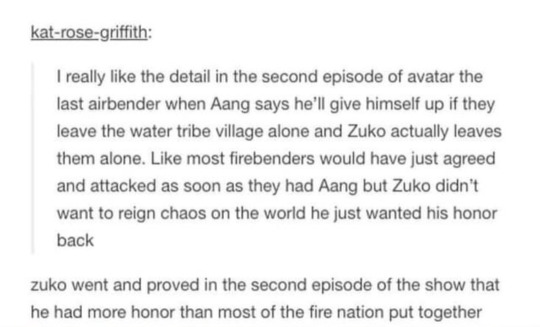
I've seen this point tossed around a lot and I can kinda see where its coming from but like.... guys. Yon Rha did that too. You know the guy who traumatised Katara for life and took her mother? He did it almost word for word.
He went on in there looking for a singular genocide survivor, found that survivor. The survivor gave themselves up after he promised to leave the village alone.
The only difference is that instead of killing Aang on the spot, Zuko took that 12 year old hostage with the goal of handing him over to the Fire Lord to be kept in conditions described as "You'll be kept alive. Barely" by Zhao.
Zuko's paralels to Yon Rha and his poor morals in the begining are crucial to his arc and to his and Katara's relationship.
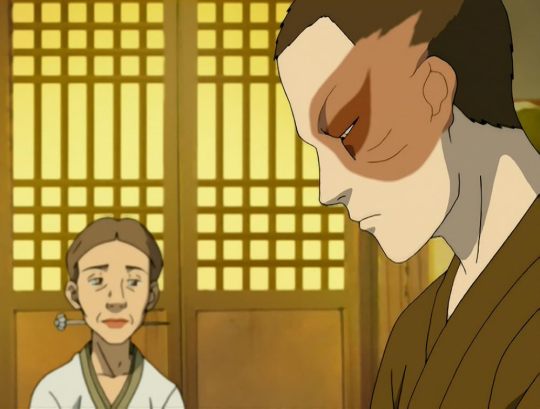
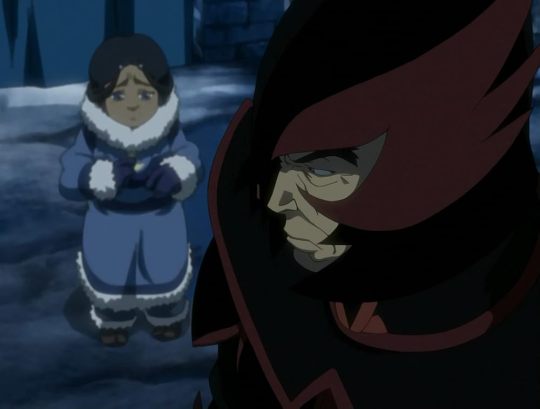
Hell, you could even point out how similarly shaped the scarlet detailing on the Southern Raiders' helmets and Zuko's scar are.
#starting to think some of you don't know what a redemption arc is#the paralels between Zuko and Yon Rha are crucial to his and Katara's relationship#as the paralels between Aang and Kya are crucial to his and Katara's too#zuko#katara#aang#anti zuko#kinda? more like#anti zuko stans#avatar#atla#avatar: the last airbender#the last airbender#avatar the last airbender#the southern raiders#yon rha
490 notes
·
View notes
Text

One of my favorite parallels in the series. Kya and Aang’s sacrifice to the fire nation are nearly identically framed here
-the fire nation was looking for the last airbender AND waterbender
-both Aang and Kya sacrificing themselves to protect katara and the southern tribe village
Love how this scene builds how attached Katara and Sokka become to Aang. He was just a stranger they happened upon. And then when he gives himself up just like that, he becomes one of them.
For their whole lives they feared the day when the Fire Nation would return to raid and take their people to never see them again. Then one day it happens, and that’s when they learn they had a no prisoners policy in the worst way possible.
That’s why Sokka was so suspicious and mistrustful towards Aang at the beginning and Katara was so drawn to him for bringing them some simple joy they haven’t know since Kya died.
When the Fire Nation arrives, their worst nightmare comes back to life as they are helpless to wonder who will die or be taken this time. Thanks to Aang, this complete stranger who had no obligations to them, it was no one but himself. Their village was safe and everyone was sound, but realized at that moment that they did lose someone special.
Book 1 is as good as book 2 and 3 :)
#avatar the last airbender#atla#aang#katara#sokka#zuko#kataang#kya#fire nation#kya would have loved aang
925 notes
·
View notes
Text
The tragedy of Katara’s parentification
Sokka and Katara were both parentified, and it’s a profoundly life-changing thing for both of them. One of the saddest things in ATLA, though, is how Sokka sort of got to outgrow parentification, but Katara never did.
Sokka’s told to be the man. The provider, the protector. He’s not so good at the former (his hunting failures are a consistent source of comic relief), and he takes failures of the latter very, very hard. He doesn’t manage to save Yue, and that wrecks him. After Yue, he becomes extremely protective of Suki in a way that’s borderline offensive to her. He’s willing to do anything to protect his friends and his family, including something as irresponsible as breaking into the Boiling Rock. I don’t think it’s a coincidence that Sokka is the only one of the Gaang who unambiguously kills. The rest of them may technically have clean hands because of cartoon logic, but Combustion Man is very dead, and Sokka is the one who killed him. We don’t know how he feels about it, because the show never goes there, but I have a pet theory that Sokka is so uncharacteristically (remember he was team “leave Zuko to freeze to death”) against Katara confronting Yon Rha in The Southern Raiders because he’s the only who knows what killing feels like and wants to protect Katara from it.
But by the end of the show, Sokka’s in a place where he can start to let go of his need to protect. Objectively, all his friends are unbelievably powerful and can take care of themselves, including his sister and his girlfriend. Suki is the one who saves him in the final battle, representing not only a reversal of his initial cartoonish misogyny, but also demonstrating that he is worthy of protection. And of course, he and his friends saved the world, so there isn’t really an enemy that he has to protect them from anymore. Sokka’s loved ones create the conditions under which his parentified behaviour is no longer necessary. Sokka would still have to take the first step to stop seeing himself as the one who has to lay his life on the line, but at least it’s possible for him.
But not Katara.
Katara had to take on the mom role after their mother was murdered, which meant she was responsible for domestic labour and emotional support. Sokka says in The Runaway that her role was to keep the family together. Unlike protection, that’s always a full time job regardless of the war. We see Katara spending more screen time than anybody cooking, getting food, mending, and generally doing women’s work. We see Katara giving everyone emotional support, including strangers and her enemy. We see Katara putting aside her own discomfort and her own hurt in The Desert because if she falls apart, they all die. Nobody ever showed her that she doesn’t need to be the only one who cooks, or that somebody else can be responsible for the emotional wellbeing of her friends, or that — god forbid — someone else can actually be responsible for her emotional wellbeing.
That’s why I never cared for the Ka/taang argument of “he teaches her to be a kid again!” Putting aside the fact that Katara ends up taking care of Aang a lot more as the series goes on, the whole tragedy of parentification is that you can never again be a child. That part of your childhood, your god-given right, is robbed from you. It is extremely precious and important to still be able to be a kid, but breaking free of parentification is not about seeing yourself as a kid. It’s about breaking free of being responsible for everyone’s feelings and behaviours.
For Katara, that responsibility is not problem of perception, but of reality. Unlike Sokka, who was told and shown that his loved ones are capable of protecting themselves, Katara has zero reason to believe that her loved ones are able to feed and clothe themselves and not fall apart emotionally. Between Toph and Sokka who emphatically don’t want to do this work, it all falls on Katara. Telling a parentified child that they just need to loosen up is akin to telling an overworked mother that she needs to just relax (“happy Mother’s Day! You get a break from chores, which you will catch up on tomorrow because nobody else is doing them”). It doesn’t accomplish anything if nobody creates the circumstances under which it’s possible to let go of responsibilities. A lot of Zutara fans, spanning all the way back to the early days of the fandom, like the “Momtara and Dadko” trope where Zuko also does chores. Why? Because even without the concept and language of parentification, many fans recognized that Katara’s performance of domestic and emotional labour is inequitable and probably very taxing.
Growing out of parentification is about more than just letting go of old expectations: it’s also about finding a new way to value yourself beyond the role you grew up with. I’ve said this before, but it’s very important to acknowledge that just because a kid is parentified doesn’t mean they’re actually good at being a parent. In fact, it’s probably a given that they’re not, because they’re kids performing roles that are developmentally inappropriate! Sokka remains a shit hunter; he becomes a decent fighter but he’s still miles behind his friends. A big part of healing from his parentification is finding another area — strategy, engineering, project management (what else do you call that schedule) — where he actually excels, to which he can dedicate his time and from which he can derive satisfaction and a sense of identity. For Katara, fighting for the oppressed and combat waterbending give her that. Crucially, however, Katara does not stop being a girl when she becomes a warrior. She’s still responsible for domestic and emotional labour. Unlike Sokka, whose protector duties were more or less relieved as the series went on and he found new ways to contribute to the group, Katara continued to perform her old role in addition to her new one (which is depressingly realistic btw, look up feminist theory around the concept of the second shift). Still, it’s important that she found these new ways to value herself and her contributions…
…which disappear in her adult life. Where’s adult Katara fighting for the oppressed? Where’s adult Katara enjoying her status as a master waterbender? Where’s Mighty Katara? Where’s the Painted Lady? Where’s the person who vanquished a whole Fire Lord?
What do we know about adult Katara? She’s no longer a rabblerouser or an ecoterrorist. She did not translate her desire to help the downtrodden into a political role, like being Chief or on the United Republic Council. She’s not known as the best waterbender in the world, only the best healer, even though her combat abilities are what she took the most pride in. Even as a healer, she established no hospitals, trained no widespread acolytes (except Korra, I guess?), and made no known contributions to the field.
What Katara is known for…is being a wife and a mother. The same role she was forced to take on at age 8. One which she performed for the next 80+ years.
#Self-proclaimed feminists who don’t see Katara’s trajectory as a tragedy…I want to know what you’re on because I’d like to use it to cope#Katara deserved better#anti kataang#as always my anti kataang posts are more#anti Bryke#very mild#zutara#pro Katara#pro Sokka#water sibs#They just give me so many feels#my meta#Katara parentification discourse
792 notes
·
View notes
Text
Rewatched book 1 after watching the live action and here is a list of everything that wasn’t in the live action that I think should have been :
Sokkas war paint
Saying the words “hair loopies”
Barely seeing the boomerang
Katara being able to calm down aang during the avatar state
The comet
Importance of mastering all 4 elements
Sokka dressing in kyoshi warrior clothing and learning the strength of women (removing and growing from his sexist beliefs)
Zukos honor /destiny (think it’s mentioned once?)
Mouthfoaming guy
Aang water bending
Roku manifesting and telling jeong jeong to teach aang firebending
Aang trying fire bending too soon and burning katara which leads to him being hesitant on learning firebending in book 3
Katara finding out about her healing abilities
Aang being selfish by keeping location of Sokka and kataras father from them
Aangs crush on katara
Aang doing everything he Can to heal his friends in the swamp
"Miyuki, did you get in trouble with Fire Nation again?”
Rokus dragon
Aang dealing with the guilt of leaving the southern air temple and all his people getting killed and not accepting his role as avatar
Sokkas intuition for recognizing Jets deceit
Sokka being a natural inventor (it’s barely even touched in the live action) Sokka is smart and creative
Katara’s dedication to learning water bending by stealing the scroll
Katara’s jealousy of aang being able to bend and learn faster than her
Kataras fierce determination and her take no shit personality
The cruelty of the fire nation by imprisoning earth benders into work camps (this is just one example)
Katara’s selflessness and bravery by getting herself imprisoned in the war camp and saving all the prisoners shows how much empathy Katara feels for people and always wanting to help those who can’t help themselves
Showing how master jeong jeong and others left the fire nations army because of its cruelty (fire nation people can be good and recognize the evil in their own ranks)
How aang feels upset about the disrespect and condition of the northern air temple/legacy of his people but accepts it in the end knowing they need this temple as their home
Using the fallen war balloon to create a fleet of airships in the final battle with Ozai
Appa being a badass and also fighting to protect aang multiple times
Iroh and his white lotus tile (this is important foreshadowing for later seasons)
The healer in the northern water tribe recognizing the betrothal necklace and realizing it belonged to her friend and kataras grandmother, kanna, who was engaged to master pakku of the northern tribe but left to live in the South Pole
Katara confronting pakku and telling him “I’ll be outside if you’re man enough to fight me” ( the challenge is off screen in live action, dumb choice tbh just glad we got to see the physical fight at least)
Pakku finding the betrothal necklace and talking about kanna and katara saying her gran left because “she wouldn’t let your stupid tribes customs control her life” which in turn makes pakku reconsider and start teaching katara waterbending
Pakku complementing kataras skill saying she’s has advanced faster than any other student he has trained (this shows how great and powerful of a water bender she truly is)
How strong the water benders are at night especially during the full moon
How the moon was the first water bender
Zuko kidnapping aangs body while he is in the spirit world
“You rise with the moon, I rise with the sun”
Not showing emotion to koh cause he’ll steal your face
Zuko talking to unconscious aang telling him how everything always came easy to his sister, she’s a firebending prodigy. Ozai telling Zuko that azula was “born lucky while Zuko was lucky to be born” (another instance of ozai’s cruelty as a father)
Talking about how iroh has been to the Spirit world
Zuko trying to challenge katara during a FULL MOON” “Here for a rematch?” “Trust me Zuko it’s not going to be much of a match” and then her kicking his ass in 5 seconds
Aang showing compassion to Zuko by saving him again despite Zuko kidnapping his body
Iroh staying with katara Sokka and yue after the moon spirit is killed (this shows his heart)
Yues body disappearing and her spirit kissing Sokka and her saying “I’ll always be with you”
The ocean spirit grabbing zhao and dragging him into the sea
Pakku wanting to help rebuild the southern water tribe
Pakku Calling her Master katara and saying she’ll train aang from now on
Azula appearing at the end and Ozai sending her on a task because Zuko is a failure and iroh is a traitor
#if something that is listed here was shown then oops my bad g#avatar the last airbender#atla#aang#katara#sokka#zuko#azula#ozai#fire lord ozai#iroh#zhao#netflix avatar#natla
1K notes
·
View notes
Text
i dont like the take that zutara is the like 'sexual' ship or something. not only bc im really uncomfortable with thinking that any relationship with teens is 'sexual' on screen - i really don't want to think about teenage characters in a kids show as sexual - but also because i feel like this perception of katara feels very madonna-whoreish
with a@ng, katara is the madonna, she needs to be perfect and pure. she can do no wrong and is held to an unrealistic standard that puts her under a lot of pressure. this results in katara's canonical traits and moments that don't fit this narrative being seen as monstrous, or even ooc. the problems with the madonna are the fact that by viewing katara like this, you won't ever see her as a character fully. she revolves around this idea of what she is to a@ng, and anything that strays from it is 'morally wrong' (it's not.)
according to antis, with zuko, katara is the whore. zutara explores a darker 'more sexual' side of katara that is connected to the canon moments that don't allign with a@ng. they are able to push all of the things they don't like about katara (and women) onto this ship of her with someone who is not a@ng. to them, katara's proximity to aang is what makes her the madonna, but with zuko, she is everything that they hate about her.
in all actuality, there is nothing inherently sexual about zutara. they don't have any moments that could even hint to sex when other couples in the show do. zutara is seen as sexual, not because there's anything actually sexual about the ship, but because they see katara without a@ng as a whore (not actually saying they call her a whore.) they feel more free to hate on her and allow themselves to call it sexual as a way to justify it. zutara isn't any more sexual than any other ship, less in some cases, but it will always been seen as such because antis see katara as a madonna with a@ng and a whore with zuko.
(i would just like to clarify that this is talking about generalizations. obviously not everyone who dislikes zutara feels like this, but i think this i a common way that people view it, even if they don't realize it.)
507 notes
·
View notes
Note
Personally Kat.aang looks bad to me because Aang gave his most lightest skinned child special treatment 💀 there were air acolytes who weren’t air benders themselves but were still dedicated to keeping the culture alive so leaving Kya and Bumi out on account of them not being air benders is absolute bullsh*t. You don’t see Zutara shippers calling Kat.aang shippers racist because of it 🤔
yeah see this is one of those things that again ties back to bry.ke being totally oblivious about the implications of what they were writing because the optics of the kat.aang family are… troubling, to put it nicely.
the darker-skinned woman is a waterbender. the lighter-skinned man is an airbender. the nonbender is conveniently in-between. their clothing all correspond strictly to their individual elements (except bumi who gets chucked to red for the audacity of not being born an airbender — at least till he conveniently turns into one). if you knew nothing of these characters you’d never know they were biracial at all.
which is just… so disappointing. part of the reason i love zutara is how the fandom handles the incorporation of both cultures, and yet bry.ke couldn’t even be bothered to do the bare fucking minimum of at least having the kat.aang kids in blue and yellow clothes. if you’re going to claim that a significant aspect of this new, postwar world is the increased cultural exchange across nations then the kat.aang family of all people should be emblematic of that change! but no, instead of taking the opportunity to actually delve into and depict the intricacies of a blended household, we might as well just stick to the same shit we’ve been doing since atla because why think of something new, right?
it’s even more troubling that within the strange cultural division of the ka kids, it’s katara’s culture that gets the shaft. tenzin’s entire family might as well be air nomads through and through, and while bumi and kya seem to have been intentionally excluded from air nomad culture through no fault of their own, they don’t seem to know (or care) any more about their swt heritage either. the natural conclusion to draw from that is evidently that katara’s culture just doesn’t matter as much as aang’s in their family, and that paints a very disturbing picture of how aang views his wife’s heritage (especially with the worldbuilding of atla portraying the air nomads as ‘spiritually pure’ in comparison to everyone else).
i have no patience for the common ka defense that aang is a survivor of genocide so his culture should take more priority because a) katara is also a genocide survivor, as ka stans are so fond of pointing out until it doesn’t work in their favour and b) why are we acting like cultural integration is some sort of zero sum game? tenzin, kya and bumi aren’t going to run out of space for their air nomad traditions and practices just because they know more about their swt background as well. there’s no arbitrary limit on how much you can learn of your heritage.
yes, i know bry.ke didn’t intend for the ka family to come across this way. but whether the implications were purposeful or not, they still exist, and it’s fucking galling that the fandom will call zutara and zutara shippers racist all while defending the shitty writing choices of two american white men — and then pat themselves on the back for being progressive, as if genuine activism means harassing real poc in the name of fictional ones.
194 notes
·
View notes
Text
Opinions. I have them and I want to share them. On the Netflix live action specifically.
It's a little over a year since the release of Netflix ATLA and since then I've kind of just been stewing on it angrily as if it's insulted my mother or something, and there's more things that I've been meaning to say that I never mentioned in my original reviews, specifically on why I think this live action is doomed to fail. It all has to do with media literacy, because these writers don't seem to fucking have any.
An example I want to talk about is the waterbending scroll. I want to bring this up specifically because this is a mistake m night shyamalan's movie also made. I will be referring to them as Natla (netflix atla) and tla (the last airbender movie).
Both natla and tla have the waterbending scroll in their story. I'm sure the writers gave themselves a pat on the back for including this important story element. But what is very apparent is that they do not understand why this scroll is in the story, because in both live actions Katara gets handed the scroll by someone. In tla she gets it handed by strangers who tell her it was stolen from her people by the fire nation and that she should be given it back. In natla, she gets handed the scroll from gran gran. In both of these instances this scroll can be replaced with literally any other object. It could be a rock that strengthens a bender, it could be a letter written by someone, it could be a stick. In both versions, the narrative reason for the scroll being there in the first place is missing completely.
In the original show, the scroll is specifically part of the story to develop Katara's character, because she doesn't just get it handed to her, she steals it. And it's a decision she makes herself without discussing it with anyone else. Katara going out of her way to steal the scroll from pirates, and not really seeing an issue with it because the pirates stole it from someone else first, tells us a lot about Katara's moral compass and how she sometimes likes to twist her ethics to fit her own narrative. In any other instance Katara would tell people stealing is wrong. Literally later on in book 3 she tells Toph something similar, that she can't just scam people just because they were scamming her. But because this scroll is something she desperately wants so she can improve her own waterbending, she tells herself it's fine to steal this because it didn't belong to those pirates in the first place. She believes as a waterbender she has more right to own this scroll than those pirates do. It shows us how committed she is to learning waterbending and connecting to that part of her culture, because she's willing to go quite far in order to achieve this. Later though she gets faced with the consequences of her own actions, because stealing the scroll lead to the pirates teaming up with Zuko and chasing her and her friends, which ends up endangering Aang.
In this episode she also obsesses over the scroll to a toxic degree. One of the excuses she uses to justify her stealing it is because she wants Aang to learn too. But it becomes obvious that this is just an excuse, because she tries to claim the scroll for herself by saying Aang can have his turn after she learns, even though it's kind of more prudent for Aang to learn first as the Avatar (because the episode before this we literally just learned about the comet and our end of summer deadline to learn all four elements). It shows that Katara isn't some goodie two shoes, and that she has some ugly sides to her. She can be sneaky, selfish, stubborn, immature, and has difficulties letting go when she has her mind set on something. Then when Aang gets caught by Zuko she realizes that she caused all of this, and she apologizes to Aang who then tries to be a good boy and tell her it isn't her fault, but then Iroh kind of throws it back in her face that yeah, this is in fact her fault.
This episode also shows us development between Aang and Katara's relationship. We learn that Aang being naturally better at something is a difficult thing for Katara to swallow, and while Aang tries to make her feel better by encouraging her and telling her she's a great teacher, he doesn't manage to solve the problem which is that she feels inferior to him here. Later on, he acknowledges that just like him, Katara is a waterbender. She doesn't just know some waterbending moves, she IS a waterbender. Then they work together to escape, this makes Katara feel better, and it strengthens their bond.
This entire plotline is the reason for the waterbending scroll existing in the original storyline, but all of that is missing from both live actions even though they also have the waterbending scroll in their story. I'm sure these live action writers don't see the problem, they probably think the pirate episode is just filler they can cut without consequences, because the scroll is the only thing that's retained in the rest of the story after this episode. But that's simply not the case. This episode is much more consequential, even though it's not immediately obvious or visible, and that's what these live action writers do not seem to grasp, which is what I mean when I say they lack media literacy. They think the only thing that makes that episode worthwhile is the object that is obtained, and because they don't want to go through the hassle of adapting the whole pirate episode the only element they keep is the scroll. But everything about this scroll and why it's narratively necessary is removed.
This lack of understanding of character development and how to write a good story is why Katara's character is so bland in both live actions. All her agency gets removed. She doesn't decide to steal the scroll, she doesn't decide to help Aang save the world, she doesn't decide to ignore Sokka's instincts on Jet, she doesn't decide to deliberately ignore the northern watertribe's customs on bending.
The worst part for natla specifically is that the writers seem to understand that certain moments in the show need to happen, but they don't understand why. Katara needs to fight Pakku because she's so angry about the northern watertribe's sexism, this ties in to Sokka's sexism earlier in the season. She went through the trouble of traveling all the way to the north, stealing a waterbending scroll, getting burned by Aang on accident to discover her healing abilities, and now she's being told she can't train to fight simply because she's a girl? She's been confronted with sexism her whole life and she knows she's capable of more, so she's done succumbing to it, she fights the patriarchy by fighting Pakku. In natla she fights him too, but her anger lies solely with Pakku not willing to teach her, and not with sexism as a whole. She didn't fight that whole season in natla in order to learn waterbending, she just simply trained a bit and got better because boys told her she was strong, so there's no anger for her to feel towards Pakku because there's no buildup. The writers know the Pakku fight needs to happen but they removed everything in the story that leads to Katara fighting Pakku.
A similar thing happens with certain side characters. The writers understand that Teo and The Mechanist are important characters, and we need to add them so we can have them show up for the invasion too. But they don't understand what their purpose was in the original show in the first place, which was character development for Aang. Similar with Jet, he was there for Sokka's character, this episode showed us Sokka is intuitive and intelligent, but doesn't get taken seriously because he's the goofy nonbender older brother. That also gets removed in natla, because Sokka doesn't even interact with Jet more than once. He doesn't even get told Jet's name at all!
This is the biggest writing flaw that is recurring throughout the whole first season of natla, and probably won't be solved in the next seasons. I've seen a lot of people say natla is good because they got more things right than tla, but imo natla is just as bad as tla with similar reasons. Just because the costumes looked more like the original, or because they added more things that happened in the original than the movie did, does not mean natla is good whatsoever. I'd argue it kind of even makes it worse, because natla shows the trouble these people went through to have more accuracy than the shyamalan movie, and yet they still missed the mark this badly. I'm honestly angrier at this live action than the movie, and I might not be the only one.
#atla#avatar the last airbender#avatar#natla#netflix atla#netflix#the last airbender#the last airbender movie#m night shyamalan#dori rambles
130 notes
·
View notes
Text
Do certain Katara fans even like Katara at this point?
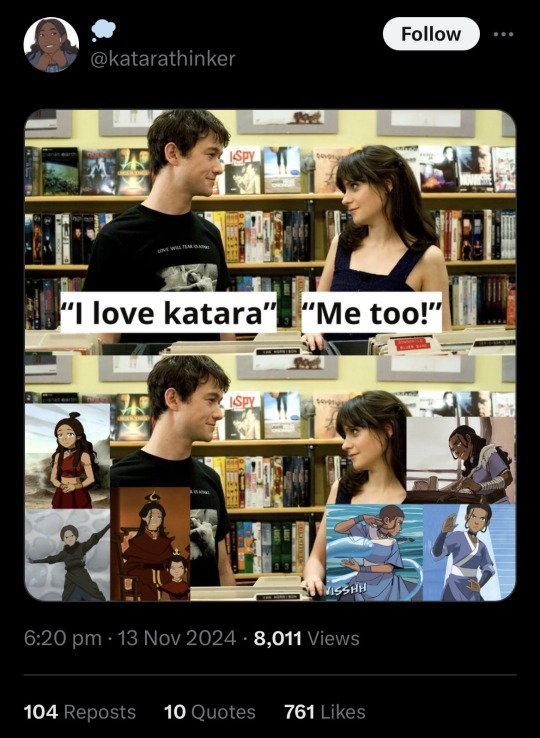
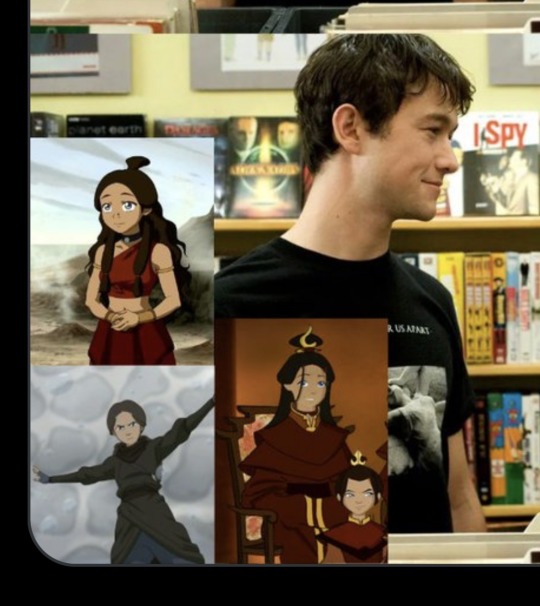
This is a viral post on Twitter with +100 retweets, it was posted by a famous Kataang acount. As you can see, the ‘lame idiot’ character in the meme likes The Southern Raiders, Katara in FN clothes, and the Fire Lady Katara headcanon.
I’m not going to add to the Fire Lady Katara discourse because I honestly don’t care- but why would a Katara stan belittle the SR episode? Genuinely, what is there to dislike?
Southern Raiders is one of Katara’s finest moments. She gets to pour out all of her righteous anger and be unapologetic about it, without having to mother or take care of anyone. She seeks retribution not only for herself but for all of the victims of the genocide in her tribe. She displays more maturity than 99% of the characters in this show when she rejects the eye-for-an-eye ideology but denies Yon Rha any absolution. She stands proudly and proclaims herself as the last southern waterbender without any fear. By the end of the episode, Katara has formed her own ideology, which she states succinctly:
Aang: You did the right thing. Forgiveness is the first step you have to take to begin healing.
Katara: [Rises from boardwalk.] But I didn't forgive him. I'll never forgive him. [Smiles at Zuko and walks up to him.] But I am ready to forgive you.
Katara doesn’t believe in blanket forgiveness. She doesn’t need to forgive her abuser to move on and heal. However, she will see the goodness in people who work to better themselves.
To see a Katara stan reject this episode and mock it is perplexing to me. I understand that everyone has different tastes- but if you think that liking Katara in TSR is for idiots, do you even like her?
Now onto a less important point: Why is Katara in her FN clothes in the ‘idiot’ side of the meme? Katara loved those clothes! Look how excited she was to wear the silk robe, she was giddy with enthusiasm! And even after they stop disguising themselves, she continues wearing them. Again, why would a Katara stan hate this part of her character? She clearly likes those clothes. Let this girl enjoy her pretty flowy robes.
#katara deserved better#anti kataang#i like the ship but damn do the fans make it hard#pro katara#katara#the southern raiders
209 notes
·
View notes
Text
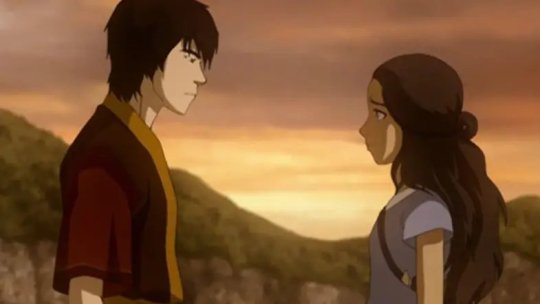
How The Bond of Zuko and Katara Enhances the Themes of A:TLA
When a subplot is intertwined with a story’s core themes, it creates a more cohesive experience, resonating more profoundly with viewers. For this reason, a good writer must always aspire for a coherent narrative in all of its aspects. So, what are the themes of A:TLA, and how do Zuko and Katara fit into them? To answer that, I’m going to break down each theme and discuss how it relates to the pair.
On Destiny
Your destiny might be unexpected, controversial, but it’s yours. No one can take it away from you. In Lake Laogai, Zuko and Iroh shared the following exchange:
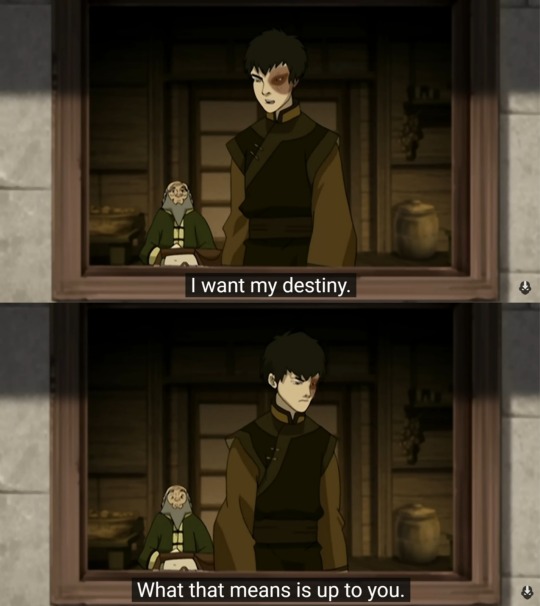
Even if people try, even if it isn’t acceptable to other people. Your identity will always be there, and you must make the choices that reflect your identity will always be there, because it’s your destiny. Near the series finale, in Sozin’s Comet Part 2, Iroh said:
“Sozin's Comet is arriving, and our destinies are upon us. Aang will face the Fire Lord.When I was a boy, I had a vision that I would one day take Ba Sing Se. Only now do I see that my destiny is to take it back from the Fire Nation,so the Earth Kingdom can be free again”.
In the end, everyone goes to their destinies. The destinies that they’re forging. Aang will spare the fire lord, Toph will use her metalbending to take down the airship, and Zuko and Katara will stand side by side against Azula. Who would have thought? Your destiny might be really surprising. No one could have guessed that Toph would invent metalbending, or that Aang would meet a lion turtle, or that Katara would stand by her former enemy’s side - by Zuko’s side.
Katara and Zuko’s closeness fulfill the show’s themes of destiny by being subversive and unexpected. They are fire and water, the daughter of the chief and the fire lord. Their friendship is rather odd, but it’s their destiny - not what was forced upon them. Moreover, their bond is subversive because it didn’t start as lovingly as it ended. Zuko and Katara were enemies, no one could have anticipated that they’ll grow close, but as I said, and the show said, destiny can come from an unexpected place.
On Diversity
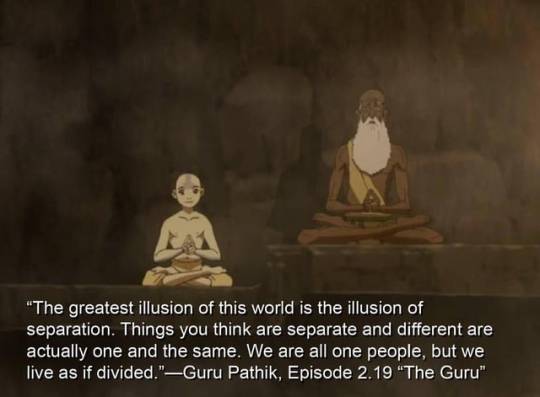
Separation is an illusion as well as the four nations.
Zuko and Katara were not only enemies, from opposite sides of the war, but they were polar opposites – the Prince of the Fire Nation and the last waterbender of the small Southern Water Tribe, fire and water. However, all of these differences didn't matter for them to form a beautiful friendship. Because they're not actually separate, they're both kind empathetic people. They have much in common. The superficial predetermined differences aren't separation. They're one in the same.
Additionally, one will gain from learning about the other nations, or as Iroh put it:
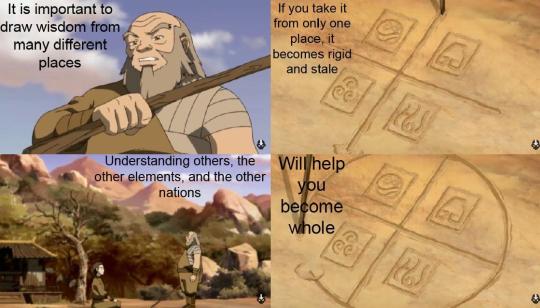
Zuko and Katara leaning into their opposites ties into the theme. In fact, Zuko himself learned to redirect lightning from a waterbending technique.
On Redemption
Many characters in A:TLA were given a chance to redeem themselves. From Mai and Ty Lee redeeming themselves by betraying Azula near the end of the show to Iroh whose redemption has long ended before the story starts. A:tla firmly tells us that while the path to redemption can be long and hard, it’s a path worth paving and it’s yours to carve. Zuko’s redemption arc specifically is praised as one of the best redemption arcs in tv history.
A part of Zuko’s journey towards redemption is his interactions with Katara. Earning her forgiveness is his final step into integrating into the Gaang, and his final act of redemption is to jump in front of a lightning bolt for her. It’s significant that it’s Katara who represents these milestones in his arc. He redeems himself to everyone, but not in the same way as Katara. The path to redemption through Katara’s eyes is longer and ends with a bang.
On Morality
Black and white notions of the world are incomplete. The Fire Nation isn’t all evil, as seen in The Headband, their citizens are simply indoctrinated. And there can be band people on the other side of the war, such as Jet. Fire isn’t just destruction, it’s also healing and life. And the opposite of fire can be just as destructive, as seen in The Puppetmaster when Hama showcases her bloodbending. In 06×03 A\ang concludes the following:
“Anyone’s capable of great good and great evil.Everyone, even the Fire Lord and the Fire Nation have to be treated like they're worth giving a chance.”
When Zuko and Katara first met each other, they thought of each other as enemies and nothing more. Katara saw Zuko as his worst self and the manifestation of her hatred of the Fire Nation. In the Crystal Catacombs Katara described him as "the face of the enemy". She saw him as all black and no white, but then he opened up. They discover they actually have shared experiences despite being on opposing sides. When he betrayed her, it seemed to confirm that they're not similar, that everything Katara thought of Zuko was correct. Of course, he came back, but Katara can only forgive him once she lets go of some of her hatred of the Fire Nation. His connection to Katara proves that they’re both seeing the world as shades of gray.
—————————
In conclusion, the profound connection between Zuko and Katara enhances the themes of the show and their connection is a perfect example of the messages it’s trying to put out. Rather it’s about destiny, morality, diversity or redemption, Zuko and Katara’s relationship is remains one of the most relevant examples of these themes in the show.
#zutara#anti anti zutara#pro zutara#zutara analysis#zutara evidence#zutara forever#zutara meta#zutara nation#zutara should have been canon#zutara supremacy#zutara was robbed#zutarian#zuko x katara#katara x zuko#kataraxzuko#zukoxkatara#katara#zuko#atla
205 notes
·
View notes
Note
Wait, what’s going on with Embers???? That fic has been on my read later list since 2021, what’s happened with it???
Brief overview, then I'm likely never touching this topic again, because this is not a Drama Blog:
Context: Embers is a super old AtLA fic that was written during the early fandom days, read widely at the time, and was the origin of the widely-used fanon name of "Wani" for Zuko's ship (kind of by default that it was one of the first popular fics to give his ship a name, I think?), even though most fic writers don't seem to realize it's from there anymore.
"What's Going On": I used to include a link in all my stories to it, because I believe in crediting other writers for borrowed elements, and I was using "Wani" in all my fics. But BOY did I not want to be sending readers that way anymore, so I've adopted a new name for Zuko's ship, and removed all Embers links.
None of the criticisms about Embers itself are new; I'm assuming they date back to when the fic was being written, because this isn't an "it aged badly" thing, this is an "actually yeah this gets worse the longer you think about it and I shouldn't have ignored my bad feelings just because some of the worldbuilding was interesting" thing.
An Incomplete List of Why I Made the Change:
I don't actually like the story that much anymore, and don't want to rec it
I tried to re-read it recently to see if some things were as bad as I remembered and it turns out they were So Much Worse Oh Yikes. More specifically, the treatment of Katara and Aang and their respective cultures has... rather a lot going on. One example: The Fire Nation and Air Nomads are both given multiple backstory elements in an attempt to make the average Fire Nation soldier's participation in the genocide/war in large part the fault of the Avatar and the Air Nomads themselves, and also fully justified from the Fire Nation perspective. And I do mean fully. One of its core tenants is "People from the Fire Nation (and only people from the Fire Nation) who don't follow orders Literally Die, therefore murdering pacifists and babies and continuing the war (and their regularly scheduled war crimes) is the only thing it is physically possible for them to do". I cannot emphasize enough how literal that is.
Also the name "Wani" means "Alligator" and is... objectively a pretty lame name for Zuko's ship? Where's the personality, where's the deeper meaning, where's the resonance with Zuko's themes? @tuktukpodfics initially thought I was calling the ship "Wanyi", and that's what I've switched to, because it is Objectively So Much Better. In their words: “Wànyī (萬一): Literally ��one in ten thousand,’ ‘perchance.’ Used grammatically in Chinese to mean ‘what if’ or ‘just in case.’ I think a ship called ‘The Perchance’ is perfect for a boy clinging to false hope.”
TL:DR; I don't rec Embers anymore, because I don't actually like the story anymore, and there are things about it that get worse the more I think on them. I've removed links to it and renamed Zuko's ship to "Wanyi" ("The Perchance") because our boy deserves a ship name that reflects his character arc.
#for the record if you ever find something kind of rancid in my fics#do please let me know#EX: I've rewritten scenes to be better Actual Blind Rep for Toph based on blind reader feedback#and I'm debating how hard it would be to ignore/re-write the canon issues of Water Tribe sexism (for the Southern Tribe at the least)#because that is a common complaint I see from the people who's RL cultures the Water Tribes was based on#probably I can do more interesting things with that going forward#in other words justice for Hama and Hahn#at least the show itself made Hama excellently complex#anyways back to doing actual writing#please no follow up questions#though I will say anyone who wants to update their own fics to use Wanyi (or any other name): go for it!#all you need to do is plop your chapters in a word editor and find/replace the ship name! it took about 40 minutes to do literally#all of my fics and I had some other editing to do besides! it'll be even quicker for you!#let's sink the Wani#avatar the last airbender#atla#Zuko
497 notes
·
View notes
Note
Do you think some parts of the world would have been unhappy in Aang's decision to spare Ozai? That people would be so bitter - this madman gets to live, while their friends and loved ones died? Why is that? Oh - because the Avatar didn't want to compromise his own morals, to kill someone? Tough, it's a war. People die.
The thing I don't like about the way the show frames it is that the narrative doesn't really give Aang a choice, either.
I think people who frame this as Aang respecting Air Nomad culture are trying to give the show too much credit, because the show doesn't act like Aang gets to choose a moral high ground, they act like he has no choice. Aang seems to believe that the only way he can honor his Air Nomad heritage is by not killing, and...what about all the Air Nomads who didn't have that luxury? What about Gyatso, who was faced with the choice of kill or die, and killed, and died?
I think a lot of people would see Aang's choice as a slap in the face. Every person who had to do things they considered against their personal morals to survive. People like Jet who sincerely wished to stop leading a violent life, but couldn't, because that life was chosen for him the moment his parents were murdered. People like Hakoda who felt deeply ashamed of having to leave his own children to go to war. Are these people just inherently less moral or more bloodthirsty than Aang? No, they simply didn't have the power Aang had at his disposal that allowed him to avoid the kind of violent lives that many people, children included, were forced to lead during the war.
That's also why the "Aang reminds Katara/Zuko that they are kids" thing annoys me. What Aang does is remind them that HE has the luxury of thinking of himself as a kid while they don't. The reason Katara hadn't been penguin sledding in so long isn't because she's a buzzkill who hates fun or she "forgot" that she's a kid, it's because she was forced into a role where she had to take care of her family in her mother's absence, and that doesn't go away with the introduction of another kid she has to parent. As for Zuko, that "well you're just a teenager" line is funny and it's easy to think of Zuko as someone who takes himself too seriously (and part of why it's funny is that teenagers in general do view themselves as so much older than younger children), but Zuko was kicked out of his home at thirteen and expected to be fighting a fully-realized adult Avatar. Even when he was Aang's age, he never had the luxury of thinking of himself that way. You can see this also in the way Zuko interacts with adults early in the series, notably Zhao and his crew. He is desperate to be seen as a hardened adult because he has had to act like one to survive.
These people don't act this way because they've lost their morals or sense of fun or because they don't value peace enough. They act this way because this is what they were forced to do to survive. I think people would rightly be offended by the idea that wanting to see Ozai dead for his crimes makes them just as violent as a genocidal tyrant, and they would be right to feel resentful that Ozai gets to live when he was responsible for so much violence. This is also why Zuko tells Ozai that he's lucky that Aang spared his life. Because in the end, Aang has NO moral obligation to spare Ozai whatsoever, not because of his culture or any reason. Pacifism has never meant that you aren't allowed to use necessary force to stop violence from happening. And anyone who uses the argument that Aang has to spare Ozai because of his culture or that this is his only way to honor his people is LYING.
#atla cricitical#zuko#katara#antikataang#only slightly but tagging because i'm not interested in arguing about this
196 notes
·
View notes
Text
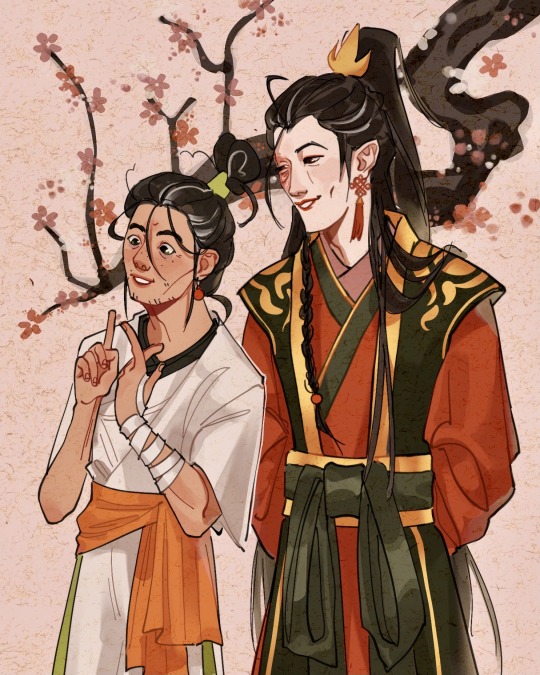
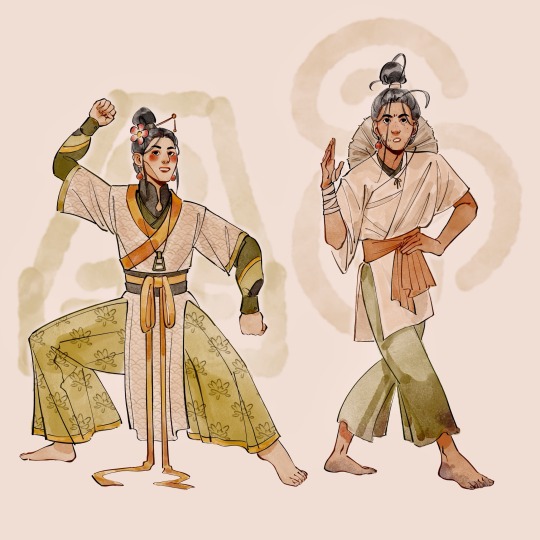
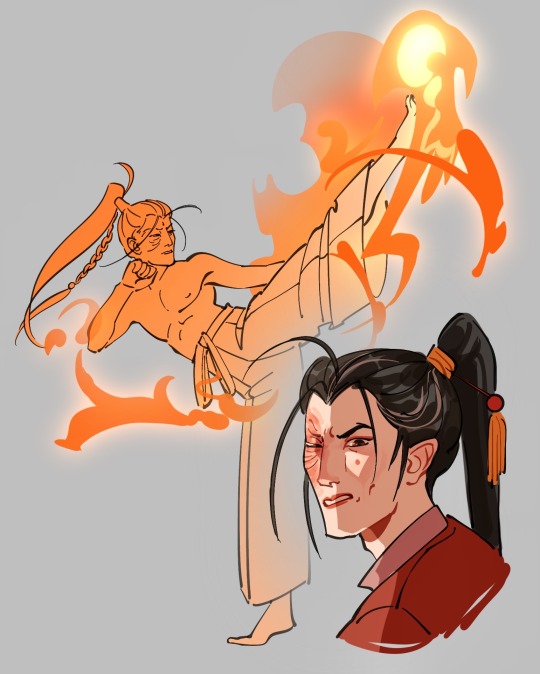
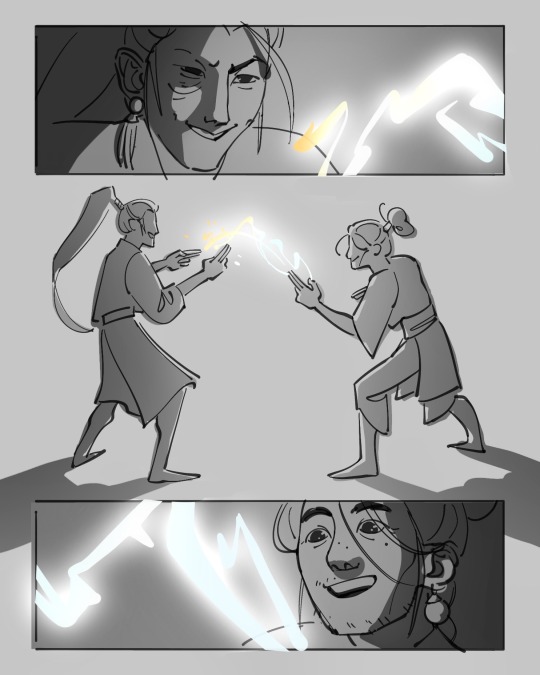
fire, air, water, earth.
prince xie lian is one of the most promising up-and-coming avatars the world has yet to see. that is, until disaster strikes his home earth kingdom of xianle. when his people die out at the hands of a plague spirit, bai wuxiang, the nations blame the avatar. with his reputation destroyed, xie lian joins the air nomads for 20 years and travels the world as a scrap-collector. although he has lost the respect of the people he is destined to protect, the spirit world is thrown into chaos without his guidance. xie lian works thanklessly to maintain global balance all on his own. but unbeknownst to him, there's one person, upon the throne of the fire nation, who still believes in the avatar.
welcome to my tgcf x atla au!
click here to follow this tag for updates. read more below for my story notes.
STORY
xie lian is born to the king and queen of an earth kingdom city-state, xianle, and is quickly discovered to be the avatar. a wildly talented one, at that. he learns firebending second, and waterbending third. still young and pampered, xie lian struggles with the humility associated with airbending principles.
at just the age of 17 he begins to travel the world to master the four elements and [katara narrator voice] to restore peace and balance in the world. he acquires a servant (firebender mu qing) and a bodyguard (earthbender & childhood best friend feng xin). it's during this time that he tours the fire nation, meeting with political figures and impoverished citizens alike, gaining a positive reputation for his determination and skills. to celebrate the summer solstice, xie lian is the face of a festival in which he proves his elegance, combative strength, and firebending prowess. during the ceremony, he controversially interrupts it to save the life of a 10-year-old urchin boy.
the lines between the spirit and mortal worlds bleed together during solstices. it's xie lian's festival which attracts a particularly violent spirit to emerge into the mortal world: bai wuxiang. the white-clothed calamity.
xie lian's life is filled with promise until he turns 22. he catches word of a disaster taking place in his home kingdom. he puts a pause on his tour of the nations to return to xianle. there, he finds that a strange and highly contagious disease has begun plaguing his people. its symptoms are unnatural; the work of an angry spirit. xie lian works himself to the bone trying to save his common people. he fails.
when xianle falls to plague, to chaos, to fear, its people blame the avatar. he is dubbed the avatar of misfortune. a failure. xie lian's reputation crumbles to dust and he is helpless to restore his people's faith in him. when the rest of the world learns of how xianle came to ruin, the avatar becomes not a figure of peace to be revered, but a bad omen.
having lost his two companions, his parents, his kingdom, and the global adoration he's come to rely on for his self-worth, xie lian runs away. he disowns his past identity and seeks to start a new life. he finds himself in the northern air temples, where the air nomads pay him no mind, although xie lian is a bit of an oddball. (xie lian might look rougher and jaded but they certainly recognize the avatar. they pretend to not know him—the nomads keep to themselves and as long as xie lian doesn't cause trouble, he is welcome.) he eventually befriends a monk named shi qingxuan.
xie lian seeks enlightenment. he incorporates himself into the monks' way of life, releasing all ties to material possessions and worldly indulgences. he abstains from sex, alcohol, anger, and, hardest of all, grief. he goes on to live 20 years as a scrap collector, practicing what he was taught by his teacher and guide, monk wu yong. xie lian knows it's time to leave the temples when he finally masters airbending.
humbled, xie lian rekindles his fighting spirit. the common people loathe the avatar, but he forgives them. he will save them.
as xie lian wanders the nations, he learns that during his darkest years, literature, art, and scholarly works of the avatar have been destroyed. most people don't even remember what he looks like and much less have the means to learn anything about him. (hua cheng carving xl's face into the side of a mountain: HOLD MY BEER)
meanwhile, there is a fire nation urchin boy who has grown into someone powerful enough to be feared. through his unmatched wit and charisma, he has worked his way up the capital's political hierarchy. a city governor who calls himself hua cheng, is the first aristocrat to challenge the firelord to an agni kai. he is also the first to win. he delegitimizes the royal bloodline and single-handedly reshapes a generation's idea of a competent ruler. bonus points for the previous firelord being xie lian's indecent cousin, qi rong.
now 35 years old, the new firelord, terrifying yet respected by all, leads his people to prosperity and vanquishes every enemy. peculiarly, he seems somewhat uninterested in his position of power. instead, he enjoys turning his attention towards erecting a shrine, a palace, in honor of avatar xie lian.
HUALIAN'S BACKSTORY
the avatar preceding xie lian, jun wu, oversaw great conflicts between the four nations. it is during one of these wars that a seemingly insignificant teenager dies. his soul drifts aimlessly in the spirit world, vulnerable, alone. he encounters the trickster spirit koh who steals his face. time is hard to account for in this realm, and the once-a-teenager forgets his past life, his own identity, simply choosing to refer to himself as wu ming: nameless. many years later, the avatar cycle begins anew with the birth of xie lian.
at 7 years old, prince xie lian and his best friend feng xin are outdoors playing with swords. feng xin takes a break, as he is called inside by the king of xianle, leaving xie lian outside and unsupervised. (feng xin will shortly be told that xie lian is not only his friend, but now his responsibility.) meanwhile, xie lian is left without a sparring partner. until a ghostly silver butterfly flits in front of him. it playfully weaves around the flourishes of the blade. xie lian chases it, away from the palace grounds, across the fields and into the brush, where he falls head-first through a burrow. when he stands up, his sword has disappeared, but not the butterfly. it pulls his attention upward, where he takes in his surroundings: the spirit world.
xie lian continues to play and greet spirits, who are all pleased to meet the new avatar, eventually finding a sad, dissipating ghost fire. the ghost introduces itself as wu ming. xie lian works very hard to cheer it up, promising they'll be friends in this lifetime and the next. wu ming brightens and confesses that koh has stolen its face. xie lian fails to tolerate this news: if he's to be the avatar, he must protect the innocent and slay monsters. with wu ming's warnings, he marches to koh's den to demand his friend's face back.
xie lian succeeds. wu ming doesn't remember much these days, but he's sure that no one has ever showed him such incredible kindness. when wu ming expresses his desire to disappear, xie lian gives him a mantra: "live for me."
xie lian has to leave, to return to a very worried feng xin (who is scared he's already failed his new bodyguard job on day one), but wu ming is invigorated with life like never before. his soul persists, stubbornly, for the avatar. he is reborn back into the mortal world as a fire nation boy. although, the encounter with koh would leave a mark on his body: the sclera of his right eye would be an unsettling blood red. the people of his village would know him as hong hong-er.
elsewhere in the spirit world, the ghost of avatar jun wu senses young xie lian's presence. he also senses the persistence of the ghost fire—a soul reborn. could he, too, return to the mortal world? jun wu entertains a simple but horrifying thought: by swapping places with xie lian, could he achieve immortality as the world's last avatar? thus, jun wu hatches a plan. he strikes a deal with bai wuxiang, the white-clothed calamity, a malevolent plague spirit. bai wuxiang would possess the body of jun wu to eliminate the new avatar. to kill xie lian, and to be reborn.
the plan doesn't go—well, according to plan. the people of xianle are wiped out before he can get his hands on xie lian, and the destruction of a people leaves behind a universal distrust of the avatar. jun wu realizes he would be unable to seize power in such an environment. his new strategy must involve controlling young xie lian, manipulating him into a puppet. it takes a while to pin him down, but jun wu eventually finds him settled in the northern air temple, at his most emotionally vulnerable. jun wu will impersonate a monk teacher, changing his name to wu yong. he will bide his time and play his cards until the world is ready for his return.
EXTRAS
hualian are middle-aged men in this au because it makes sense timeline-wise, but also because sexy silver fox xie lian is what i see every time i close my eyes.
narratively, i'm torn between hua cheng loving the avatar, or hua cheng loving xie lian. thinking about this timeless lovestory, "you, not the state of you," i can see it both ways. hua cheng might love the avatar, xie lian and all of his reincarnations regardless of their body. or, he might love xie lian, regardless of the "avatar" title. ("avatar" may also be this world's equivalent to hua cheng respectfully calling xie lian "dianxia".)
firelord hua cheng presents himself at what he believes is his ugliest, most intimidating form: exposing his burned right eye. as san lang, however, he is at first ashamed to reveal such a vulnerable part of him in front of his love; he covers it with an eyepatch. (the people of the fire nation are like: "a platypus?" [san lang takes off his eyepatch] "PERRY THE PLATYPUS?!?!")
hua cheng teaches xie lian how to bend lightning. they easily trade bolts back and forth to each other in a cute and intimate way. feng xin and mu qing are horrified when they first see this in action.
hualian's first kiss happens when they're battling a sea monster underwater and xie lian loses his concentration enough to accidentally pop hua cheng's air bubble. a little mouth-to-mouth resuscitation will do the trick until they can float back up to the surface.
ruoye = xl's spiritual serpent guide (kind of like roku's dragon)
e'ming = hc's super clingy fire ferret
#hualian atla au#tgcf au#atla au#xie lian#hua cheng#hualian#hualian au#jun wu#tgcf#tian guan ci fu#heaven official's blessing#mxtx#my art
490 notes
·
View notes
Text
i love zuko as much as anyone else but i find it so absurd that there are people out there who hates the little kid from zuko alone, because he got angry at zuko after finding out who he was.
like,, first of all, that's a child. but even that is besides the point because it would still be perfectly understandable if an adult got mad at zuko the same way.
because zuko is from the fire nation. and not just anyone from the fire nation, he's royalty, the crown prince. he is part of the people who destroyed the lives of these people. who took this kid's brother away from him and very nearly tried to take him too. of course he's going to hate zuko after realizing that he's the crown prince of the fire nation.
sure, we know that zuko is not all bad, that he wants to be better and has the capacity to be better. because we're the audience who has been following his journey from the start.
but the kid doesn't know that. all he knows is that this guy showed up out of nowhere and was nice to him, and then suddenly reveals themselves to be the head of the people who have been ruining his life.
and this is why katara haters sound so stupid too. because katara also hasn't seen zuko's entire journey or what good is in him. her anger and hatred towards him was perfectly justified, especially after she has begun to connect with him and then he backstabs her and joins azula.
people think that just because the audience is seeing a character's entire arc, that means that all of the other characters must be aware of it too. that's not how this works, the characters in a story are not omniscient. they only know what they're shown.
#and even when they know that a person is capable of being good that doesn't mean they should always be forgiving and understanding#we've all been mad at people despite knowing that they're ultimately good people#sometimes shit just happens#atla discourse#anti stans#atla#avatar the last airbender
56 notes
·
View notes